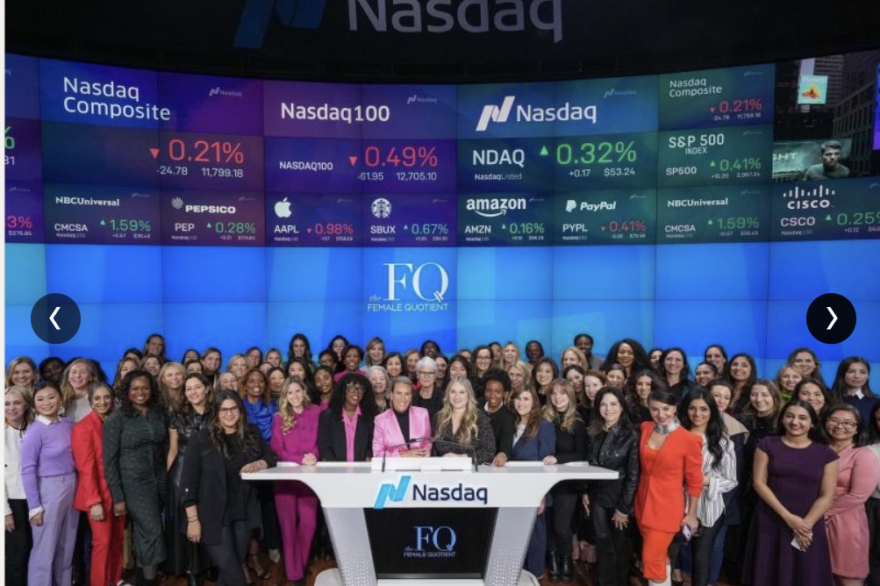As Women’s History Month comes to a close, Nasdaq had women leaders at Monday’s closing bell.
With only 10% of Fortune 500 companies led by women, the symbolism of having some of the most innovative women at the intersection of finance, funding, and founding at the ceremony was not lost on attendees.
“We all know that VCs are investing only 2% in female founders, and even less than that in women of color,” Shelley Zalis, CEO of the Female Quotient, said in a speech before ringing the closing bell. “But, we also know that women-led startups are outperforming their male counterparts, generating more than 63% more value and twice as much per dollar invested. Women drive wealth.”
Yahoo Finance interviewed three leaders at the event, asking their thoughts on women and women of color being called so-called “unicorns” as well as their thoughts on equality versus equity. Here’s what they said.
On being called unicorns
The unicorn moniker often bestowed on female leaders in the tech world is a disservice to women entrepreneurs and founders because it acts as an excuse to not hire or invest in women, Brenda Darden Wilkerson, president and CEO of AnitaB.org, told Yahoo Finance.
“The unicorn narrative goes that ‘we can’t find them,’ ‘don’t really understand that particular demographic,’ or ‘it’s too risky to invest’ so come back when you’ve made your first 10 million,” Wilkerson said.
In 1985, women were 35% of tech and now it’s 12%, Wilkerson noted, but even at the height of women representation in tech, the narrative remained they were hard to find. Not only are women being overlooked for leadership roles, but also when it comes to funding companies to go public. Women-led startups receive only 2.3% of venture capital funds.
“If you Google how many female founders have taken their companies public you’ll see that the number is somewhere between 22-45 — it’s an alarming number,” Sehr Thadhani, chief digital officer at Nasdaq, told Yahoo Finance. “Female founders need more pathways to the public market — figuring that out will have a rippling impact on the entire business ecosystem because when women lead, they surround themselves with other powerful, innovative women who work collectively to increase opportunities for access to wealth building and more.”
Hitha Palepu, author and CEO of Rhoshan Pharmaceuticals, talked about the need to redefine what it means to have potential and to be successful, so those definitions are more inclusive of those who often get overlooked.
“I think we need to take a look at how we have evaluated and calculated what makes a high- potential or worthy candidate. Because in the past and to date, it has all been based on how we have viewed success, which is strong, fierce, determined, tactical. And when a woman has any of these qualities, she’s called bossy, assertive, shrill, angry,” Palepu said. “So we need to take a second to actually figure out some new terms in which we use to define success, in which we use to define potential, and to actively start going into the places we haven’t recruited from.”
Equality and equity aren’t the same
The theme for Nasdaq’s event was The Equity Objective: Women in Wealth.
Equality and equity are sometimes used interchangeably, but they aren’t the same. We asked our leaders to explain what equity means and should look like in the workplace.
“Equity is about making sure that everyone who might be in a different situation has what they need in order to succeed,” Wilkerson said. “If I’m growing a garden with lettuce and tomatoes and give them the same water, they may not bloom equally. Do I say to the lettuce, you need too much water, because I equally poured? It may need different soil or sunlight.”
Equity doesn’t take away, but rather provides the necessary tools for everyone to succeed, Palepu said.
“It’s not pie, but a buffet and the food’s going to keep on coming. It’s more a matter of does everyone have what they need and what they want to eat at the time they need it,” Palepu said. “Equality is a benchmark that you can manipulate the numbers to make it look like you are equal, but equity requires an investment of time, resources, and money to actually say, ‘We are not content with how things are and we are investing in a better future.’”
Republished from Yahoo Finance
